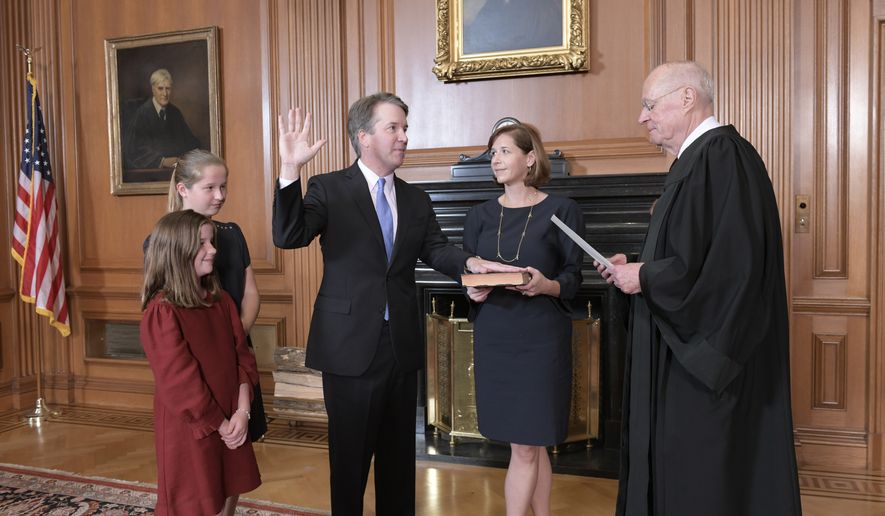Newly minted Supreme Court Justice Brett M. Kavanaugh will hear oral arguments at the high court for the first time Tuesday in cases dealing with criminal matters where his vote is expected to have a big impact.
He has taken the seat of retired Justice Anthony M. Kennedy, who was viewed as the court’s swing vote between the other four Republican-appointed justices and the four more liberal members of the court.
Court watchers expect President Trump’s newest justice to be more conservative than his predecessor, particularly in areas concerning presidential powers and criminal law, based on his record on the federal appeals court in Washington, D.C., where he has heard cases for the past 12 years.
“What is interesting is that this docket seems almost tailored for Kavanaugh to have a significant impact early,” said Jonathan Turley, a law professor at George Washington University. “This docket is like having a left-handed pitcher throw to a righty batter, it is maximizing the likelihood that Kavanaugh’s vote will be determinative.”
Tuesday’s cases deal with felons who were subsequently convicted on firearms charges. They are challenging what constitutes a burglary as a violent felony within the language of the statutes.
Though those cases could end up with somewhat narrow rulings, Wednesday’s case could have a more significant impact in the area of immigration.
It concerns whether the Trump administration can withhold bond hearings and initiate deportation for immigrants who have lived illegally in the U.S. for a long time but were convicted of relatively minor offenses.
Ilya Shapiro, a senior fellow at the libertarian Cato Institute think tank, predicts Justice Kavanaugh, like other rookie justices, will hang back a bit during the first few arguments and not pose many questions to the lawyers on either side.
“His first week, he will be kind of quiet. He is recovering from the ordeal he had,” said Mr. Shapiro, referring to Justice Kavanaugh’s highly partisan confirmation process.
Justice Kavanaugh’s view of executive authority also could be tested quickly, as the Justice Department may request an emergency stay this week in relation to a challenge brought by several states against Commerce Secretary Wilbur L. Ross Jr.’s plan to include questions about U.S. citizenship in the 2020 Census.
Mr. Ross was ordered last month by a federal judge in New York to sit down for a deposition in the case. The president’s critics say diversity would be undermined if citizenship becomes a census question.
“The deposition right now is scheduled to occur on Thursday, so there is not much time,” said Elliot Mincberg, a senior fellow at People for the American Way.
Meanwhile, the court heard six cases last week with only eight justices. Experts say if any of those end up deadlocked with 4-4 rulings, they could be re-argued before the full nine-justice bench.
One case of particular interest to conservatives was brought by Herman Avery Gundy, a convicted sex offender who is challenging the Justice Department’s authority to require hundreds of thousands of convicts to register as sex offenders even though their cases came before the 2006 registration law passed. It was argued last Tuesday.
“Even if the court splits 4-4, it is up to the justices to order re-argument,” said Josh Blackman, a professor at South Texas College of Law. “It takes five votes.”
Demonstrators who have been protesting Justice Kavanaugh’s confirmation are expected to continue their rallies outside the Supreme Court on Tuesday. His Saturday confirmation by the Senate drew hundreds of protesters to the high court’s steps over the weekend.
Although the courtroom has an area open for the public to attend oral arguments, court watchers say the high court’s police are quick to respond and often prosecute disruptions.
“It is not a place where we have seen protests in the past. There has been a tradition of decorum in the Supreme Court, which makes it almost unique in Washington,” Mr. Turley said.
• Alex Swoyer can be reached at aswoyer@washingtontimes.com.




Please read our comment policy before commenting.